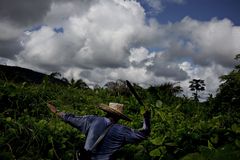First, the communities of Curbaradó and Jiguamiandó,1 located in the municipality of Carmen del Darién, department of Chocó, were victims of forced displacement. Later, they had to face the violent seizure of their land by palm oil companies. Now, as the communities have returned to their region and organised to defend their rights, threats and selective murders have increased. Nonetheless, the returned communities have been able to remain in their territory. Their objective: the legal restitution and physical return of their land.
Coveted land
Until the beginning of this century, the Curbaradó and Jiguamiandó River Basins were considered to be among the greatest environmental reserves in the world. Land in the Lower Atrato —especially the immense wetlands created by the Atrato and Murindó Rivers—is exceptionally fertile.2 However, vast areas of this territory have been subjected to large-scale monocropping3, extensive cattle ranching, and massive timber exploitation, which leave no place for plant and animal life or the ancestral inhabitants of this region.4

